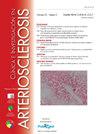Extracellular vesicles in atherosclerosis: Current and forthcoming impact.
IF 1.9
Q3 PERIPHERAL VASCULAR DISEASE
引用次数: 0
Abstract
Atherosclerosis is the main pathogenic substrate for cardiovascular diseases (CVDs). Initially categorized as a passive cholesterol storage disease, nowadays, it is considered an active process, identifying inflammation among the key players for its initiation and progression. Despite these advances, patients with CVDs are still at high risk of thrombotic events and death, urging to deepen into the molecular mechanisms underlying atherogenesis, and to identify novel diagnosis and prognosis biomarkers for their stratification. In this context, extracellular vesicles (EVs) have been postulated as an alternative in search of novel biomarkers in atherosclerotic diseases, as well as to investigate the crosstalk between the cells participating in the processes leading to arterial remodelling. EVs are nanosized lipidic particles released by most cell types in physiological and pathological conditions, that enclose lipids, proteins, and nucleic acids from parental cells reflecting their activation status. First considered cellular waste disposal systems, at present, EVs have been recognized as active effectors in a myriad of cellular processes, and as potential diagnosis and prognosis biomarkers also in CVDs. This review summarizes the role of EVs as potential biomarkers of CVDs, and their involvement into the processes leading to atherosclerosis.
动脉粥样硬化中的细胞外囊泡:当前和未来的影响?
动脉粥样硬化是心血管疾病(CVDs)的主要致病因素。动脉粥样硬化最初被认为是一种被动的胆固醇贮存疾病,如今则被认为是一种主动过程,炎症是动脉粥样硬化发生和发展的关键因素。尽管取得了这些进展,但心血管疾病患者仍然面临着血栓事件和死亡的高风险,这就需要深入研究动脉粥样硬化发生的分子机制,并确定新的诊断和预后生物标志物,以便对其进行分层。在这种情况下,细胞外囊泡(EVs)被认为是寻找动脉粥样硬化疾病新型生物标志物的一种替代方法,也是研究参与动脉重塑过程的细胞之间相互影响的一种方法。EVs是大多数细胞类型在生理和病理条件下释放的纳米级脂质颗粒,其中包含来自亲代细胞的脂质、蛋白质和核酸,反映了细胞的活化状态。EVs 最初被认为是细胞废物处理系统,目前已被认为是无数细胞过程中的活跃效应物,也是心血管疾病潜在的诊断和预后生物标志物。这篇综述总结了 EVs 作为心血管疾病潜在生物标志物的作用,以及它们参与导致动脉粥样硬化的过程。
本文章由计算机程序翻译,如有差异,请以英文原文为准。
求助全文
约1分钟内获得全文
求助全文
来源期刊

Clinica e Investigacion en Arteriosclerosis
PERIPHERAL VASCULAR DISEASE-
CiteScore
3.20
自引率
6.20%
发文量
44
审稿时长
40 days
期刊介绍:
La publicación idónea para acceder tanto a los últimos originales de investigación como a formación médica continuada sobre la arteriosclerosis y su etiología, epidemiología, fisiopatología, diagnóstico y tratamiento. Además, es la publicación oficial de la Sociedad Española de Arteriosclerosis.
 求助内容:
求助内容: 应助结果提醒方式:
应助结果提醒方式:


